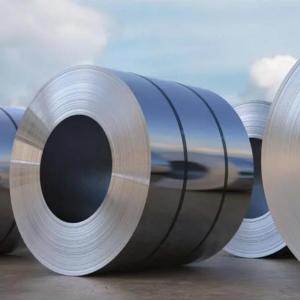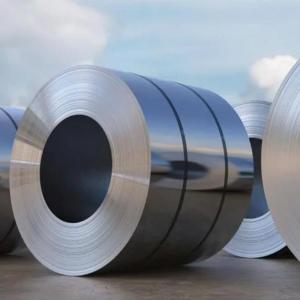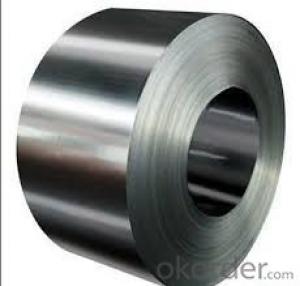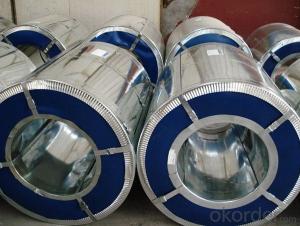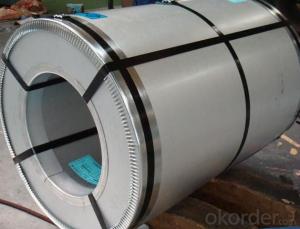Cold Rolle Steel Coil DC01 DC01EK DC04EK
- Loading Port:
- Shanghai
- Payment Terms:
- TT or LC
- Min Order Qty:
- 25 m.t.
- Supply Capability:
- 50000 m.t./month
OKorder Service Pledge
OKorder Financial Service
You Might Also Like
Details of Cold Rolle Steel Coil
The raw material of cold rolled steel coil is high quality hot rolled product, and after pickling, continuous rolling, degreasing, annealing, skin pass, slitting and cut to length line etc.
Along with it many kinds of new technology and new process of global cold rolling production have been applied. Therefore the quality of the goods could be guaranteed.
Standard: AISI,ASTM,BS,DIN,GB,JIS
Grade: DC01
Thickness:0 .8/1.0/1.2/1.5
Technique: Cold Rolled
Surface Treatment: Bright or black annealed
Width: 900mm-1500mm
Steel Grade: DC01, DC01EK, DC04EK
Tensile Strength: 270Mpa
Yield Strength: 270-410Mpa
AVAILABLE SPECIFICATION
| Thickness | 0.3-4.0mm (Full Hard Starting From 0.10mm) |
|---|---|
| Width | 30-2000mm |
| Sheets Length | 0-6000mm |
| Coil ID | 508mm or 610mm |
| Surface Treatment | Matt Finish/Bright Finish, Oil/Dry |
| Annealing Methods | Bright Anneal/ Black Anneal |
| Coil Weight | 5MT-25MT |
| APPLICATION | Steel Drum,Galvanized Steel, Steel Pipe, Home Appliance,Automobile etc. |
STANDARD & GRADE

Package & Shipment
| Package | Export standard packing(can do as required) |
| Container shipment | 20ft container/40ft container |
| Bulk shipment | if big order,then will save freight cost(while shipline may only one time one month) |
| Delivery | 20days(short as 7days,as many sizes in stock ) |
Picture of Cold Rolle Steel Coil
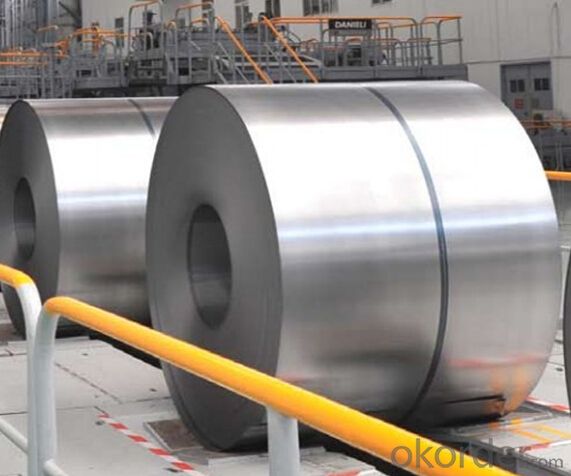
APPLICATION
Steel Drum, Galvanized Steel, Steel Pipe, Home Appliance, Automobile etc.
- Q:What are the different steel coil finishes available?
- There are several different steel coil finishes available, including hot rolled, cold rolled, galvanized, and coated finishes.
- Q:What are the applications of steel coils?
- Steel coils have a wide range of applications across various industries. One of the primary uses of steel coils is in the construction industry, where they are commonly used for structural purposes. Steel coils can be shaped and formed into various shapes and sizes to create beams, columns, and other structural components for buildings, bridges, and infrastructure projects. Another significant application of steel coils is in the manufacturing of automobiles. Steel coils are used to produce different parts and components of vehicles, including body panels, chassis, frames, and engine parts. The high strength and durability of steel make it an ideal material for ensuring the safety and longevity of automobiles. Additionally, steel coils are widely used in the manufacturing of household appliances, such as refrigerators, washing machines, and stoves. The versatility of steel allows it to be easily molded and formed into different shapes and sizes, making it suitable for various appliance components. Steel coils also find applications in the energy sector, particularly in the production of power generation equipment and pipelines. Steel coils are used to manufacture turbines, generators, and other equipment used in power plants. They are also utilized in the construction of pipelines for transporting oil, gas, and other fluids. Furthermore, steel coils are extensively employed in the fabrication of storage tanks, industrial machinery, and agricultural equipment. They are also used in the production of furniture, shelving units, and various metal products. In summary, steel coils have a diverse range of applications in construction, automotive, appliance manufacturing, energy, and other industries. The strength, durability, and versatility of steel make it an essential material for various structural and functional purposes.
- Q:What is the average flatness tolerance for steel coils?
- The average flatness tolerance for steel coils can vary depending on the specific industry and application. However, a common industry standard for flatness tolerance in steel coils is typically around 0.25% to 0.5% of the coil width.
- Q:What are steel coils used for?
- Steel coils are used for a variety of applications, including manufacturing automobiles, construction materials, appliances, and machinery. They are also used in the production of pipes, electrical appliances, and packaging materials.
- Q:What are the different methods of surface inspection for steel coils?
- There are several different methods of surface inspection for steel coils, each with its own advantages and limitations. Some of the most commonly used methods include: 1. Visual Inspection: This is the simplest and most basic method, where an inspector visually examines the surface of the steel coils for any defects such as scratches, dents, or discoloration. While this method is subjective and dependent on the skill and experience of the inspector, it can be a cost-effective option for detecting obvious surface defects. 2. Magnetic Particle Inspection (MPI): This method involves applying a magnetic field to the steel coil and then applying iron particles on the surface. Any defects or cracks in the surface will disrupt the magnetic field, causing the particles to gather at those areas and making the defects visible. MPI is particularly useful for detecting surface cracks and defects that may not be easily visible to the naked eye. 3. Eddy Current Testing (ECT): ECT is a non-destructive testing method that uses electromagnetic induction to detect surface defects on steel coils. A probe with a coil is placed near the surface of the coil, generating an alternating magnetic field. Any changes in the electrical conductivity or magnetic permeability of the steel due to surface defects will cause a change in the induced current, which can be detected and analyzed. ECT is effective for detecting cracks, corrosion, or other surface irregularities. 4. Ultrasonic Testing (UT): This method uses high-frequency sound waves to inspect the surface and subsurface of steel coils. A transducer sends ultrasonic waves into the steel, and the reflected waves are analyzed to detect any changes or anomalies in the material. UT can identify defects such as cracks, delaminations, or voids within the coil, providing valuable information about the overall structural integrity of the steel. 5. Optical Inspection: This method utilizes advanced imaging techniques, such as cameras or laser scanners, to capture high-resolution images of the surface of steel coils. These images can be analyzed for defects, such as scratches, pits, or other irregularities. Optical inspection can provide detailed information and is often used in conjunction with other methods for a comprehensive inspection. It is important to note that each method has its own limitations and may be better suited for specific types of defects or surface conditions. Therefore, a combination of these methods is often employed to ensure a thorough and accurate inspection of steel coils.
- Q:If i get a samurai sword made of carbon steel, what is the hardest thing i can hit before it breaks? Or will it not break?
- The term carbon steel by itself doesn't mean much. All steel has carbon in it. The definition of steel is iron that has been heated and had carbon dissolved into it and trapped on cooling into its atomic matrix. The amount of carbon in a particular piece of steel does have an effect on its properties. The more carbon it has, the harder it is, but also the more brittle it is. So you can have a high carbon steel blade which is very hard, and holds a great edge, but is likely to break. Or you can have a low carbon steel blade that is very tough and hard to break, but dulls easily. Your real, traditional samurai swords were made to have a core of low carbon steel, jacketed with an outer layer of high carbon steel. Thus they were very strong and hard to break, yet had an extremely hard, sharp edge. If that's what you have you can probably whack away to your hearts content. But you probably have some kind of homogenous steel reproduction type blade. What you can do depends on what steel was used.
- Q:What are the different types of steel coil packaging materials for export?
- Some of the different types of steel coil packaging materials for export include wooden crates, steel crates, steel frames, steel racks, plastic wrapping, and cardboard boxes. These packaging materials are chosen based on the weight and dimensions of the steel coils, as well as the specific requirements of the export destination.
- Q:How are steel coils used in the manufacturing of electrical appliances?
- Steel coils are commonly used in the manufacturing of electrical appliances as they serve as the core component in the production of electromagnets. These electromagnets are used in various applications such as motors, transformers, and solenoids, allowing for the conversion of electrical energy into mechanical energy or vice versa. The steel coils provide the necessary magnetic properties and high conductivity required for efficient operation in electrical appliances.
- Q:What are the best types of steel for swords
- Don't know too much but I know combat grade katanas are made out of folded carbon-steel. Could also look into industrial steel grading systems if you are looking for something to show off at a martial arts tournament or something.
- Q:What are the main characteristics of steel coils?
- The main characteristics of steel coils include their high strength and durability, ability to withstand extreme temperatures, excellent corrosion resistance, and superior formability. Steel coils are also known for their consistent and uniform thickness, smooth surface finish, and wide range of available sizes and grades. Additionally, they are easy to transport and process, making them highly versatile for various industrial applications.
1. Manufacturer Overview |
|
|---|---|
| Location | |
| Year Established | |
| Annual Output Value | |
| Main Markets | |
| Company Certifications | |
2. Manufacturer Certificates |
|
|---|---|
| a) Certification Name | |
| Range | |
| Reference | |
| Validity Period | |
3. Manufacturer Capability |
|
|---|---|
| a)Trade Capacity | |
| Nearest Port | |
| Export Percentage | |
| No.of Employees in Trade Department | |
| Language Spoken: | |
| b)Factory Information | |
| Factory Size: | |
| No. of Production Lines | |
| Contract Manufacturing | |
| Product Price Range | |
Send your message to us
Cold Rolle Steel Coil DC01 DC01EK DC04EK
- Loading Port:
- Shanghai
- Payment Terms:
- TT or LC
- Min Order Qty:
- 25 m.t.
- Supply Capability:
- 50000 m.t./month
OKorder Service Pledge
OKorder Financial Service
Similar products
New products
Hot products
Hot Searches
Related keywords
